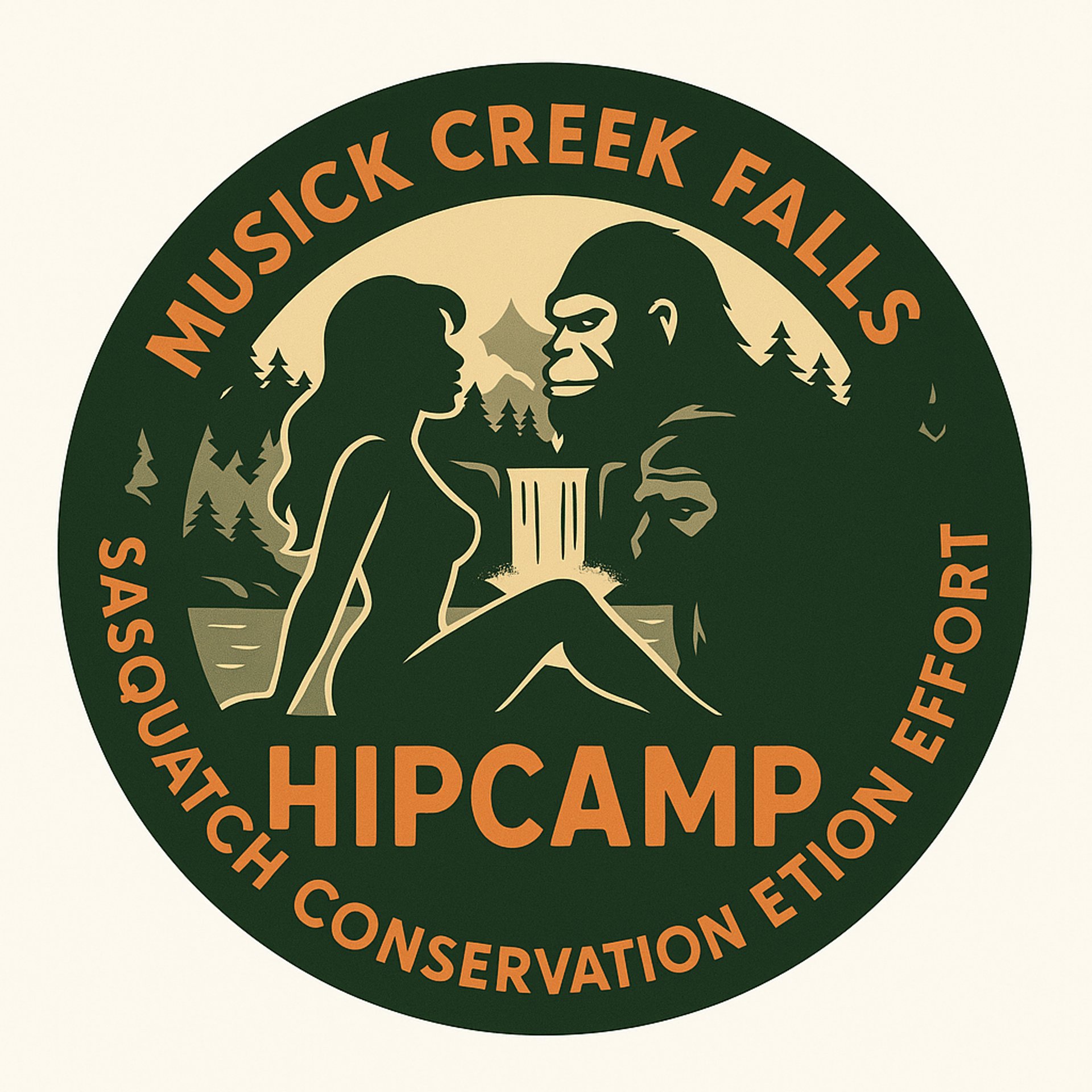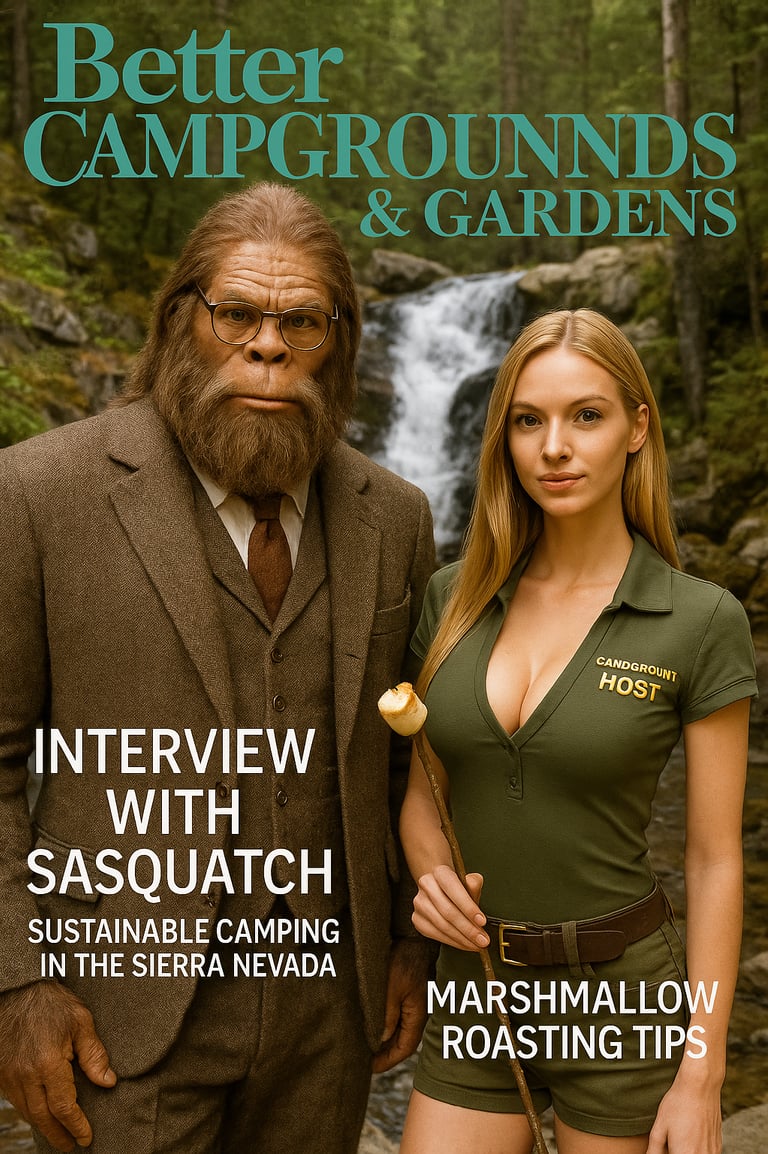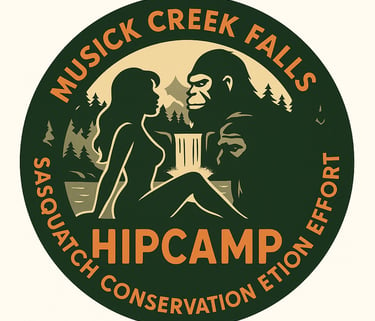
Interview with Sasquatch: The Case for Sustainable Camping at Musick Creek Falls
“An exclusive Q&A with Sasquatch at Musick Creek Falls Campground—discover why small, low-impact camping is the Sierra’s sustainable future.”
SASQUATCH
Sierra N
7/30/202510 min read



Interview with Sasquatch: The Case for Sustainable Camping in the Sierra Nevada
Better Campgrounds & Gardens (BCG) recently scored an exclusive interview with one of the Sierra Nevada’s most elusive residents – the Sasquatch. This legendary creature isn’t just a myth at Musick Creek Falls; he’s a frequent visitor and a passionate advocate for sustainable camping. In this tongue-in-cheek yet earnest Q&A, Sasquatch explains why Musick Creek Falls Campground is a model for eco-friendly outdoor tourism, highlighting its serene beauty, rich history, and the dedication of its hosts. Join us as we chat with Sasquatch about how small, low-impact campgrounds can help ensure that tourism doesn’t devastate the very wilderness people come to enjoy.
Musick Creek Falls offers intimate campsites next to cascading waterfalls. Sasquatch shares why this quiet, low-impact campground is his top pick in the Sierra Nevada.
Q: Sasquatch, thank you for taking the time to speak with us. To start, can you tell us why Musick Creek Falls Campground is so special to you?
Sasquatch: Absolutely. I’ve roamed these mountains for ages, and Musick Creek Falls is truly unique. It’s nestled on 40 acres of what I’d call pure Sierra soul, yet it has just four campsites – each one with its very own waterfallhipcamp.com. That means it stays quiet, private, and serene, which this shy old Sasquatch really appreciates. There are no paved roads or bright lights here – nights are gloriously dark and starry, like stepping back in time. In fact, on a moonless night the sky looks as pristine as it did a thousand years agohipcamp.com. Waking up to the sound of a waterfall and birdsong instead of RV generators – now that’s camping! Musick Creek Falls proves you don’t need a big, crowded campground to experience the grandeur of nature. It’s minimal impact by design, which keeps the whole place feeling like a secluded wilderness haven.
Q: You mentioned the campground’s low-impact design. Why do you believe small, low-impact campgrounds like Musick Creek Falls are the key to sustainable tourism in the Sierra Nevada?
Sasquatch: In my (admittedly large) footsteps, I’ve seen what heavy tourism can do to wild places. Smaller, low-impact campgrounds are gentler on the land. With only a handful of campsites, you don’t get the sheer crowd pressure that larger campgrounds bring – less noise, less waste, and less stress on wildlife. At Musick Creek Falls they’ve taken this to heart: the whole operation is proudly carbon-negative, meaning they actually offset more carbon than they producehipcamp.com. They blend conservation and sustainability into every aspect of the experiencehipcamp.com – from maintaining natural vegetation around sites to using a composting toilet system. Fewer sites also means the hosts can give more attention to eco-friendly details, like ensuring campers follow Leave No Trace principles and educating visitors about the environment. In short, small campgrounds like this create a more intimate connection between people and nature. They prove that we can enjoy the outdoors without overwhelming it. (As a Sasquatch known for big footprints, I prefer to leave only small footprints on the land, figuratively speaking!)
Q: Musick Creek Falls sounds idyllic. What are some of your favorite features of the campground itself?
Sasquatch: Oh, I could rave about this place all day. First off, each campsite is massive and spaced out – you’re not elbow-to-elbow with other campers. Every site even has its own little waterfall or creek cascade nearbyhipcamp.com, which is just magical. You fall asleep to the gentle sound of running water and wake up to mist in the morning. The views all around are breathtaking – dense forests, granite boulders, and vibrant wildflowers. There’s a feeling that the world is untouched here; as one camper put it, the landscape is “raw and pristine…with no light pollution,” offering a soul-filling experiencemusickcreekfalls.com. I’ve lounged in a hammock by the falls and watched the sunlight filter through pines – it’s the kind of peace you can’t find in a busy campground. And let’s not forget the stargazing. With no city lights for miles, the Milky Way splashes across the sky every clear night. I’ve spent many evenings by the campfire just marveling at the stars – it’s like having a private observatory in the woods. In a nutshell, Musick Creek Falls offers all the beauty of the Sierra Nevada without the crowds. It feels like it’s just you and nature – and maybe a friendly Sasquatch nearby.
Q: It’s not just the campground itself – the location is pretty great too. It sits near a lot of notable spots, right?
Sasquatch: You bet. Musick Creek Falls is right in the heart of some of my favorite stomping grounds in the Sierra. For instance, it’s only about a seven or eight-minute drive to Shaver Lake, which in my humble opinion is the gem of the Sierra Nevada. Shaver Lake’s crystal-clear waters and mountain backdrop make it perfect for fishing, kayaking, or a refreshing swim. (As someone covered in fur, trust me – I know a good swim spot!) The campground is also a stone’s throw from the Dinkey Creek Wilderness and dozens of trailheads. You want to hike to high alpine meadows or find secret fishing holes? All within a short drive. In winter, China Peak ski area is nearby for those who ski or snowboard. And if you’re into a post-hike soak, Mono Hot Springs is not far eitherhipcamp.com. Essentially, Musick Creek Falls serves as a quiet basecamp, tucked just off the beaten path, but close enough to all the outdoor adventures. You can explore all day – whether boating on Shaver Lake, hiking to panoramic viewpoints, or even visiting historical sites – and then be back at this peaceful retreat by evening. I love that balance: convenient to so many attractions yet worlds away in atmosphere.
Shaver Lake, just minutes from Musick Creek Falls, is one of Sasquatch’s favorite spots. He calls this sparkling lake “the gem of the Sierra Nevada,” offering fishing, boating, and stunning mountain scenery.
Q: We’ve heard glowing reviews of Musick Creek Falls’ hospitality. As a frequent guest, what can you tell us about the hosts and the overall vibe?
Sasquatch: The hosts here, Shandie and Jesse, are truly the heart and soul of the campground. I’ve met a lot of humans in my time, and these two are top-notch. Shandie is as welcoming and helpful as can be – she has a heart of gold. Campers consistently say how friendly and accommodating she ismusickcreekfalls.com. In fact, I’ll go on record to say “man, she is hotter than the Creek Fire of 2020!” (And I mean that as the highest compliment, coming from a big furry guy like me.) She makes everyone – human or Sasquatch – feel right at home. Jesse, on the other hand, is as handy as the day is long. He can fix anything, build anything, and he’s always improving the campground in thoughtful ways. He’s the one who built that impeccably clean composting outhouse everyone talks about. Honestly, even with my keen sense of smell I’m impressed by how spotless it is – not something you’d expect from an outhouse in the woods! The campsites are groomed nicely but still feel natural, thanks to their hard work. What really stands out, though, is how passionate the hosts are about this place. Jesse isn’t just a maintenance guy; he’s a storyteller and a steward of the land. Sit with him by the campfire and he’ll eagerly share the history of Musick Creek, or explain the local ecology, or talk about wildfire restoration. He’s effectively nurturing a relationship between visitors and the Sierra Nevada itself – teaching folks how to enjoy the wilderness responsibly. That kind of hospitality, where the hosts care about you and the land, creates an atmosphere of warmth and respect here. You arrive as a guest but leave feeling like part of the Musick Creek Falls family.
Q: It’s wonderful to hear how much care goes into the place. Speaking of history and stories – the campground is on land with a very rich (and sometimes dark) history. Can you tell us about some of the fascinating events this area has witnessed?
Sasquatch: You’re right – this land has seen a lot. Long before any gold miners or lumberjacks showed up, it was home to indigenous peoples for millennia. The Nuim (a band of the Yokuts) and the Western Mono people lived here in harmony with naturemusickcreekfalls.com. For them, places like Musick Creek were sacred; every stream, every meadow had meaning. They hunted and gathered only what they needed and cared for the forest through traditions like controlled burns to keep the land healthy. That balance held for generations. Then, in the mid-1800s, everything changed. In fact, local legend has it that a member of the Musick family found gold here in 1848 – an event some say helped spark the California Gold Rushhipcamp.com. Whether or not it was the first strike, it certainly drew attention. By the 1850s and onward, waves of prospectors and settlers flooded into these mountains, chasing gold and timber. They even laid down a makeshift steam-engine railroad grade through the woods here to haul out logs and ore – you can still walk on parts of that old Railroad Grade Road today, which is a neat bit of history under your feet. This little valley went from tranquil homeland to a hive of activity practically overnight.
Q: That must have led to some serious conflicts. What happened between the indigenous people and the newcomers during that era?
Sasquatch: Serious conflicts is putting it mildly. Sadly, it was a very turbulent and bloody time. The influx of miners and lumbermen encroached on Native lands and disrupted the old waysmusickcreekfalls.com. The Nuim and Mono saw their hunting grounds invaded, their sacred sites threatened, and naturally they fought back to protect their home. Meanwhile, many of the settlers didn’t respect the land’s spiritual value – to them, the forest was just timber to cut or ground to dig up for gold. The clash of worldviews – one of reverence versus one of resource exploitation – led to real tragedy. There were violent confrontations, and the settlers, backed by state and federal forces, responded with extreme brutality. In those days, the government actually put bounties on Native American lives. Believe it or not, officials offered around $20 for every Native scalp – man, woman, or childmusickcreekfalls.com. It’s horrifying, but true. This bounty system fueled what can only be described as a genocide, nearly wiping out the original inhabitants of this region. The contrast couldn’t be more stark: the indigenous peoples had managed the forest carefully for centuries (their controlled burning practices even prevented the kind of huge wildfires we dread todaymusickcreekfalls.com), and then within a generation the newcomers devastated the population and upset the ecological balance. The land that had once known harmony was subjected to clear-cut logging, mining, and bloodshed. It’s a very somber chapter in the story of the Sierra Nevada.
Q: That’s heartbreaking. How does Musick Creek Falls today honor or learn from that history?
Sasquatch: The beautiful thing is that today this place is all about learning from the past and healing those wounds. The hosts, Jesse and Shandie, make a point to acknowledge the Native history here – they’ve researched the stories of the Nuim and Mono people and share those lessons with visitors. There’s a kind of reverence you feel at the camp: a recognition that this land is special and that we’re stewards of it now. For example, they educate campers on traditional land stewardship – like how the Nuim used small fires to maintain forest health – and why that wisdom matters in the era of climate change and megafires. The campground also actively works to restore and preserve the land. They plant trees (helping reforest areas affected by wildfires) and remove invasive species. All of the infrastructure is eco-friendly – solar lighting, that composting toilet – to ensure the creek and soil stay clean. In fact, Musick Creek Falls is known as the Sierra’s first carbon-negative campgroundhipcamp.com, which is a fancy way of saying they give back more to nature than they take. They’re essentially rewriting this land’s legacy from one of exploitation back to one of sustainability and respecthipcamp.comhipcamp.com. And they do it in a way that’s engaging: they’ll tell the old Gold Rush tales around the campfire, or point out artifacts from the logging days, or even mention that a famous Western novelist, Louis L’Amour, once drew inspiration from these mountains. By sharing these stories, Musick Creek Falls connects campers to the full history – the triumphs, the tragedies, and now the renewal. It’s incredibly inspiring to see people come here for a fun camping trip and leave with a deeper understanding of why protecting places like this is so important.
Q: It sounds like camping at Musick Creek Falls is about more than just recreation – it’s also educational and meaningful. Before we wrap up, do you have any parting thoughts or advice for our readers who love nature?
Sasquatch: My pleasure – and indeed I do. One thing I’ve learned in my long life in the wild is that we’re all part of nature’s family. Whether you’re an 8-foot-tall Sasquatch or a weekend camper from the city, when you’re out here under the pines we all have a responsibility to take care of this place. My advice is: travel gently. Embrace the “leave no trace” ethos – pack out your trash, be mindful of your campfire, respect wildlife. Keep group sizes small when possible and tread lightly on the land. Remember that every time we venture into the forest or mountains, we’re entering someone else’s home (in my case, quite literally!). If you listen closely, the land has stories to tell and lessons to teach – about balance, patience, and respect. Musick Creek Falls is a wonderful example of how we can coexist with nature. I encourage everyone to seek out these kinds of low-impact, thoughtfully run campgrounds. Not only will you have an unforgettable experience, but you’ll also be supporting people who are doing things the right way. And hey, if you happen to spot a big furry fellow while you’re out here, don’t panic – it’s probably just me looking for s’mores! [He laughs.] In all seriousness, though, I hope folks come visit this special place, reconnect with the natural world, and then carry that appreciation home with them. The Sierra Nevada has given us all so much beauty; it’s on us to give back and ensure that beauty endures. Happy camping, and take care of our mountains – Sasquatch out.
Interviewer: Thank you, Sasquatch, for sharing your wisdom and humor with us. Your perspective truly highlights why Musick Creek Falls is more than just a campsite – it’s a model for sustainable tourism and a place of restoration for both land and soul. For our readers: if you’re looking for a quiet, impactful wilderness experience (and maybe a chance to swap stories with a Sasquatch), you now know where to go. Safe travels and remember to tread lightly!
Sources:
Musick Creek Falls – Hipcamp Listinghipcamp.comhipcamp.comhipcamp.comhipcamp.comhipcamp.com
The History and Horror of the Sierra Nevada – Musick Creek Falls Blogmusickcreekfalls.commusickcreekfalls.commusickcreekfalls.com
Musick Creek Falls – Guest Reviews & Camp Infomusickcreekfalls.commusickcreekfalls.commusickcreekfalls.com



